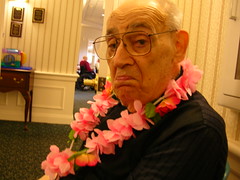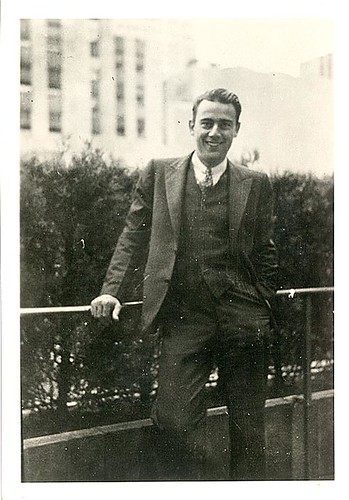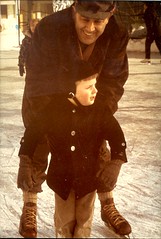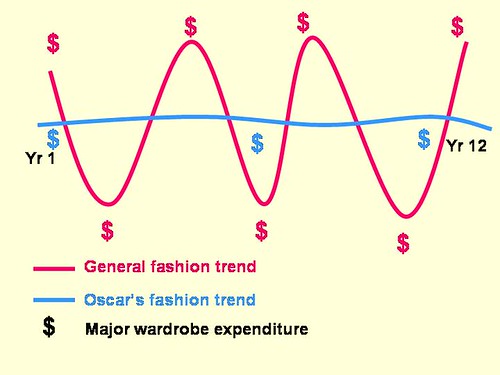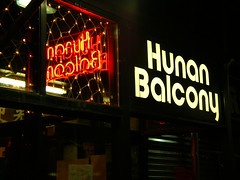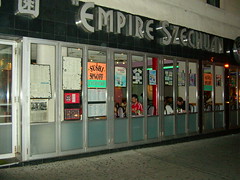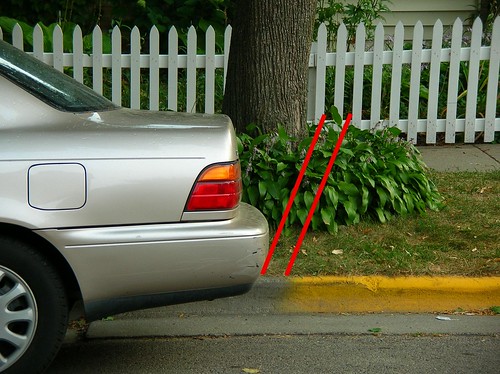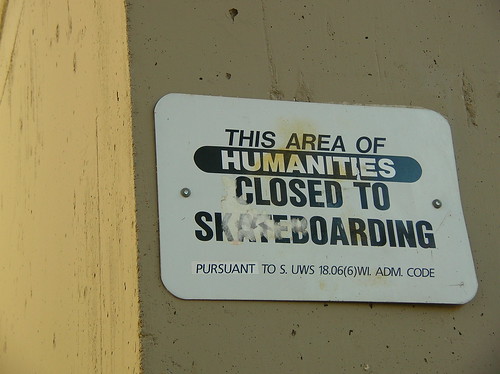Friday, September 30, 2005
Existential Friday: You should live so long
Don't forget: you will become an old person if you don't die first. Here's my Dad, a couple of weeks ago.
I like this photo of my Dad. The expression is not a goofy expression, but rather his expression of distate or disapproval -- I forget what the cause was at that moment, but it was a small passing thing. Note, too, that my Dad is wearing a lai from a theme party he was attending.
My Dad wasn't always this old. Here he is in his 20s:
I love this photo because it shows that buried forever within the old man was this beautiful young man I never knew.
Here he is again, in the Navy in WWII and later, with little Oscar on a skating rink:
I love my Dad, but what if I were asked this question: "Who would you choose as your 'old person role model,' your Dad or Supreme Court Justice John Paul Stevens?" I'm afraid I'd have to say Stevens. As I sit here now, I imagine that I want to be a sharp old guy and take myself seriously. I don't want to be the sort of old person who would allow someone to put a lai on him at a party. I'd rather die...
Stevens
And yet there's nothing silly about my Dad in the photo where he's wearing a lai. I like that photo too, because it shows this certain quality that he has, one that you or I might actually want at his age.
My Dad has the life force. This man, my Dad, would rather be alive than dead -- not everyone who is still alive at his age (he's a few years older than John Paul Stevens) is so sure about that. He has dealt with adversity his whole life and kept going. His wife, my Mom, died almost two years ago, and he has kept going. A lot of elderly people die within a year of their spouse... because they don't still have this life force.
Another one of life's mysteries.
I like this photo of my Dad. The expression is not a goofy expression, but rather his expression of distate or disapproval -- I forget what the cause was at that moment, but it was a small passing thing. Note, too, that my Dad is wearing a lai from a theme party he was attending.
My Dad wasn't always this old. Here he is in his 20s:
I love this photo because it shows that buried forever within the old man was this beautiful young man I never knew.
Here he is again, in the Navy in WWII and later, with little Oscar on a skating rink:
I love my Dad, but what if I were asked this question: "Who would you choose as your 'old person role model,' your Dad or Supreme Court Justice John Paul Stevens?" I'm afraid I'd have to say Stevens. As I sit here now, I imagine that I want to be a sharp old guy and take myself seriously. I don't want to be the sort of old person who would allow someone to put a lai on him at a party. I'd rather die...
Stevens
And yet there's nothing silly about my Dad in the photo where he's wearing a lai. I like that photo too, because it shows this certain quality that he has, one that you or I might actually want at his age.
My Dad has the life force. This man, my Dad, would rather be alive than dead -- not everyone who is still alive at his age (he's a few years older than John Paul Stevens) is so sure about that. He has dealt with adversity his whole life and kept going. His wife, my Mom, died almost two years ago, and he has kept going. A lot of elderly people die within a year of their spouse... because they don't still have this life force.
Another one of life's mysteries.
Thursday, September 29, 2005
Profound relief
Wednesday, September 28, 2005
Christmas Eve in September
I fell on my face playing hockey today. No, not figuratively. I had just made the most awesome play, where I chased down an opposing skater who was on a breakaway toward our goal with the puck. He started a good 10 feet ahead of me, but I caught up to him and from behind, stole the puck.
Turning back up the ice, I fell -- for no reason other than, as best I can tell, a feeling of unworthiness. I didn't deserve to make such a play, and felt a bit embarassed like I was showing off. My feet went out from under me, and my arms were splayed out, so my fall was broken by my chin.
Boy those hockey helmets (with the full face mask, including chin strap and padded chin guard) really work, because my chin and face experienced not a bruise or a scratch.
My neck is another matter. Doesn't smacking your chin of the ice seem like a good way to get a whiplash injury? I feel okay now, but apparently that is meaningless, because whiplash pain doesn't always show up the day of the injury.
So why Christmas? Because tomorrow when I wake up, there will be one of two things under my "tree" -- (a) a world of pain, or (b) profound relief.
Turning back up the ice, I fell -- for no reason other than, as best I can tell, a feeling of unworthiness. I didn't deserve to make such a play, and felt a bit embarassed like I was showing off. My feet went out from under me, and my arms were splayed out, so my fall was broken by my chin.
Boy those hockey helmets (with the full face mask, including chin strap and padded chin guard) really work, because my chin and face experienced not a bruise or a scratch.
My neck is another matter. Doesn't smacking your chin of the ice seem like a good way to get a whiplash injury? I feel okay now, but apparently that is meaningless, because whiplash pain doesn't always show up the day of the injury.
So why Christmas? Because tomorrow when I wake up, there will be one of two things under my "tree" -- (a) a world of pain, or (b) profound relief.
Shirts for fat guys
One of the oddities of being an academic is the need to buy "school clothes" each fall, something that always makes me feel young-in-a-bad-way. My clothes style is conservative, on the theory that certain "classic" styles look good enough that you can hunker down with them through the pendulum swing of fashion changes. It suits me because (a) I hate the process and expense of clothes shopping and (b) I would look goofy in trendy clothes.
For school, I wear pleated pants, a broadcloth button-down Oxford shirt (preferably a solid color but white is okay), and a tie -- no jacket. Basically, if I had a pager or cell phone clipped to my belt I'd look like a Home Depot Assistant Manager on lunch break.
Lately, the shirts have been hard to find. They always have solid color button downs in the fancy dress shirt fine fabric, but not so much in the broadcloth lately. Or if they do, it's flourescent colors or bright primary colors or loud prints or patterns, none of which I like.
So I was delighted to walk into a department store the other day and find a whole wall of my kind of shirt, in about 5 different (non-primary) colors and a couple with muted patterns. but when I tried them on, they all looked funny.
It was then that I noticed: these were all "The Big Shirt," "generously sized for comfortable fit." That's just a big fat euphemism for "shirts for fat guys." Well, I thought, I'll just find the regular size in this style -- but no dice!
What's the deal? Only fat guys get to wear my shirt? I mean, I'm all for fat guys having comfortable shirts, but why should fat guys get the monopoly on my shirt? Apparently, the fashion industry is telling me that if I'm not a fat guy, I have to dress like Ashton Kutcher with those form fitting, pointy collared shirt-tail-out shirts. WTF!
With my conservative, always-slightly-out-of-style look, I can get by with a major wardrobe overhaul about once every four years. In the same 12-year period when I do 3 major wardrobe overhauls, a slave to fashion has to lay out major bucks on clothes about 7 times.
For school, I wear pleated pants, a broadcloth button-down Oxford shirt (preferably a solid color but white is okay), and a tie -- no jacket. Basically, if I had a pager or cell phone clipped to my belt I'd look like a Home Depot Assistant Manager on lunch break.
Lately, the shirts have been hard to find. They always have solid color button downs in the fancy dress shirt fine fabric, but not so much in the broadcloth lately. Or if they do, it's flourescent colors or bright primary colors or loud prints or patterns, none of which I like.
So I was delighted to walk into a department store the other day and find a whole wall of my kind of shirt, in about 5 different (non-primary) colors and a couple with muted patterns. but when I tried them on, they all looked funny.
It was then that I noticed: these were all "The Big Shirt," "generously sized for comfortable fit." That's just a big fat euphemism for "shirts for fat guys." Well, I thought, I'll just find the regular size in this style -- but no dice!
What's the deal? Only fat guys get to wear my shirt? I mean, I'm all for fat guys having comfortable shirts, but why should fat guys get the monopoly on my shirt? Apparently, the fashion industry is telling me that if I'm not a fat guy, I have to dress like Ashton Kutcher with those form fitting, pointy collared shirt-tail-out shirts. WTF!
Left: Kutcher. Right: Random fashion-slave geek. Oy, what's with the vest?!
Tuesday, September 27, 2005
The seemingly innocuous email that ruined me
Well, it finally happened:
I was trapped! Think of all the emails from students who couldn't download that attachment I sent the class. And all the emails from wealthy Nigerians who need my bank account number so they can temporarily hold $4 million in my account for a few days, for which they will gladly pay me $100,000 as a thank you gift. These email senders will get a terse "undelivered" message and their emails will be lost to me forever!
Filled with frustration and rage, I searched my inbox to determine which email it was that put me over the limit. And then I had this thought: why blame the last email? Really, all of the emails contributed their proportional share to my filled-capacity problem. Longer ones take up more space, of course, but some are more important to me than others and deserve more space.
In the end, I decided to blame this email: One that most combines pointless inanity with the possibility of some professional obligation, so that I can't delete it until I read it and deal with it, yet I can't read it until I'm not terribly busy because it's so inane. I won't give you the text (I deleted it), but just the subject line:
This is the email that brought my email account crashing down last Sunday. I guess this provides the answer to my question, "what happens to an email unread"?
***** Automated Message - Please do not Reply *****I can't say I wasn't warned. And yet, what a shocker! This was Sunday, and I was in the office having Sunday-in-the-office feelings of isolation and unreality, and then to get this. I frantically deleted hundres of emails to clear space, but I got the freakin' over-capacity message again! I went to the IT web site to buy more storage space, only to find that that service could not be purchased on the weekend.
The [Freakin'] email account you use at the University provides you with 100MB of free storage. Your account is now full and you have stopped receiving new mail.
Those who send you messages are receiving a notice that their messages to you are undeliverable.
Thank you,
System Administrator
I was trapped! Think of all the emails from students who couldn't download that attachment I sent the class. And all the emails from wealthy Nigerians who need my bank account number so they can temporarily hold $4 million in my account for a few days, for which they will gladly pay me $100,000 as a thank you gift. These email senders will get a terse "undelivered" message and their emails will be lost to me forever!
Filled with frustration and rage, I searched my inbox to determine which email it was that put me over the limit. And then I had this thought: why blame the last email? Really, all of the emails contributed their proportional share to my filled-capacity problem. Longer ones take up more space, of course, but some are more important to me than others and deserve more space.
In the end, I decided to blame this email: One that most combines pointless inanity with the possibility of some professional obligation, so that I can't delete it until I read it and deal with it, yet I can't read it until I'm not terribly busy because it's so inane. I won't give you the text (I deleted it), but just the subject line:
Update on panels for forumsCan you blame me for not opening an email that says "Update on panels for forums"? I mean -- what panel? What forum? Does any email say "get information about opportunities for unrewarding, pointless but time-filling talk" more than this? If there is a bane of life as an academic, it has to be receiving updates on panels for forums. And yet, what if I were on the panel and the sender was just too dumb to put the name of the panel in the subject line?
This is the email that brought my email account crashing down last Sunday. I guess this provides the answer to my question, "what happens to an email unread"?
And like a nosey neighbor, State Farm is there
In our post-Katrina, post-Rita environment, there will be a lot of media attention on homeowners' insurance: stories about how the insurance company will be refusing to cover damage to homes by pointing to the insurance policy's "unfortunate occurrence" exclusion:
"Insurer is not liable for any loss or damage resulting from an unfortunate occurrence."Or maybe the insurance agents will simply ask intrusive or inappropriate questions in taking the claim information. Here's a recent conversation between B and our homeowners' insurance agent.
B: Does a bike have to be specially listed on our policy to be covered? I just bought a new bike.A crotch rocket? Can that be anything other than the name for a very scary sex toy? Some powerful vibrator, perhaps? Either that, or the boastful pet name some guy gives to his... er... Johnson? Either way, not something I care to discuss with the insurance carrier.
Insurance Agent: Well, that depends. Is it a crotch rocket?
B: A what???A "crotch rocket" is a motor scooter? What kind of marketing is that? It sounds like the motor scooter that Acme, Inc. would sell to Wiley Coyote, something that would shoot out from under him, leaving him suspended in the air before he painfully plummets to the bottom of the canyon. Or worse. Ouch.
Insurance Agent: It's a type of motor scooter.
B: Look, I just bought a bicycle, that's all.
Monday, September 26, 2005
The Oscar Madison Confirmation Hearings
[Transcript of Senate Judiciary Committee Hearings on the nomination of Professor Oscar Madison to the post of Associate Justice to the United States Sureme Court, having learned the lessons of the successful confirmation-hearing testimony of Judge John Roberts.]
SCHUMER: Professor, I have it here that while a college undergraduate you worked as a summer intern at the Justice Department.
MADISON: That's correct, Senator.
SCHUMER: Is it also true that in that summer internship at the Justice Department, you would literally stretch out on top of your desk -- it was an oversized government desk, I suppose -- you would stretch out and go to sleep after a late night of carousing?
MADISON: Uh, Senator -- the Justice Department frequently has cases before the U.S. Supreme Court, both as a party and as the attorneys for the government, and it would not be judicious of me to comment on matters relating to the Justice Department, as they could have cases come before the Court were I so fortunate as to be confirmed. So, no, I feel it would be inappropriate to comment on that.
SCHUMER: Well, I understand you say it's inappropriate but we'll move on. What about -- Professor Madison, would you comment on this report, this report that you, as an eight year old boy, you pulled a chair out from under your grandfather, snuck up behind him and did that while he was trying to sit down, causing him to -- to fall on the floor?
MADISON: Uh --
SCHUMER: Apparently, he did not hurt himself at that time, but you did this thinking that it would be funny?
MADISON: Senator, as you --
SCHUMER: Do you regret that now? I mean, don't you think that might have been insensitive? Not funny to your grandfather, hurtful? You realized right away, you had done something bad, didn't you?
MADISON: Senator, as you know, young people watch a lot of television, and I -- I was no exception, and many, many television shows -- be they cartoons or sit coms or what have you, will depict -- Wiley Coyote and Roadrunner, for instance -- will depict pratfalls and people having chairs pulled out from under them, and portray them as funny, and they are funny to the people watching the shows.
So, I think, I would have to say, the conduct was generally consistent with that of young persons watching such shows at that time, and I -- irrespective of "funny" or not, I think the point is that in certain contexts of the television shows it was certainly offered as something funny.
SCHUMER: Well, what about now? Don't you -- as you sit here today -- don't you think it would be wrong to do such a thing to your grandfather?
MADISON: Senator, my grandfather passed away some years ago, so no, the hypothetical situation you propose would simply not be a possibility today.
Sunday, September 25, 2005
The New York business scene: Fast banks
Banks used to pride themselves on being imposing, substantial, long-lived institutions. Part marketing, part reality, this impression was solidified by the banks' conscious choice of archetectural design. Most bank buildings constructed before World War II look like masssive mausaleums, with gigantic porticos framed by ionian pillars, meant to suggest classic government buildings. The message: permanance.
The banking industry has changed since then. Having been deregulated, it is now characterized by a fast past of merger, acquisition and takeover. And the archetecture has changed with it, reflecting both impermanence and a desparate need to pander to customer convenience.
Archetecturally, banks now look like urban fast food storefronts.
The banking industry has changed since then. Having been deregulated, it is now characterized by a fast past of merger, acquisition and takeover. And the archetecture has changed with it, reflecting both impermanence and a desparate need to pander to customer convenience.
Archetecturally, banks now look like urban fast food storefronts.
Message seen on Bank of America's ATMs:
"Would you like some fries with your withdrawal?"
"Would you like some fries with your withdrawal?"
Washington Mutual, left, has been around for a few years now, but basically came out of nowhere to sweep the nation with new branches -- probably on the strength of their innovative ideas for marketing "free checking" while passing hidden costs along to customers. Commerce Bank, right, offers convenient evening and weekend hours and no impersonal plexiglass screens, attracting both customers and robbers.Perhaps more than anywhere, New York City demonstrates this. If you're an occasional visitor like I am, you get the impression that at least one new banking chain begins, and another folds, every six months.
Here's a household name: HSBC???
What the hell kind of bank name is "North Fork"? Wasn't that the name of a movie about a bank foreclosing on Montana homesteaders? (Not quite -- the people were being forced out of their homes to make way for a dam. But still...)
It's nice to know that the next brand new bank is already
setting up to be ready for my next visit to NYC.
setting up to be ready for my next visit to NYC.
Literary pretension
From the book I'm reading, Dispalced Persons, Joseph Berger -- I know what he's saying, but I wouldn't have put it quite this way:
This thoroughly trivial event – bringing a cup of coffee and a seeded roll to a publisher’s pep talk – was like Proust’s famous madeleine: it had triggered for me the kinds of associations that rippled subversively throughout my days."...like Proust's famous madeleine..." You wish!
The New York business scene: Restaurant life spans
[See 40 Hours, Friday, 12:30 a.m.]I don't know how many thousands of restaurants there are in New York, and you've probably heard the factoid that most new restaurants in any major city close within a year. But even successful restaurants have life spans. A few famous great ones may last for several decades, but what about the smaller ones?
My two favorite Chinese places in Manhattan were within a block of each other on Broadway at 96th and 97th Streets, Hunan Balcony and Empire Szechuan. The Balcony had the best cold sesame noodles I've ever tasted, and Empire had a number of great entrees -- a killer Mongolian beef, for instance.
These restaurants had their heydays in the mid-1980s and have been steadily declining ever since. I've continued going to the Balcony for the cold sesame noodles, enjoying those and ordering increasingly desultory main courses just as a placeholder to round out the meal.
Last Friday night in New York, I went to the Balcony around 12:30 a.m. -- not particularly late for a meal in the city that never sleeps, but was told "you can have dinner, but we're closing in 15 minutes." Considering the whole place smelled like a freshly mopped restroom, I turned on my heel and walked out for what is probably the last time.
Hunan Balcony: it's glory days are now just a blur.
So I ventured into Empire Szechuan for the first time in several years. I did so despite two obvious problems. Number one, the lighting in the restaurant's sign was out.
Not a good sign. Nor was this other sign:
Can you imagine saying to a friend or loved one: "Hey, let's go to the discount sushi place tonight!" What, is it day old sushi?
I ordered dinner there nonetheless, so desperate was I for Chinese food. How was the food? The answer: after I'd had a few bites of General Tso's Chicken, my friend looked at me and asked hopefully, "Not as disappointing as it looks?"
I'm guessing that the Balcony and Empire have favorable lease terms that will enable them to hunker down with their tiny clientele for many years. But as restaurants in my life, may they rest in peace.
Saturday, September 24, 2005
More adventures with Yahoo mail page advertizing
New ad on my Yahoo email portal page:

We don't just find viruses.
We zap em.
Get protection that both searches for and cleans known viruses.
Tell Me More
Can someone please explain this ad to me? That is, if there's anything to it other than "let's catch their attention with breasts!"

We don't just find viruses.
We zap em.
Get protection that both searches for and cleans known viruses.
Tell Me More
Can someone please explain this ad to me? That is, if there's anything to it other than "let's catch their attention with breasts!"
Officer, arrest that man -- he sucks!
I think most of the great cities have some sort of municipal law that makes it technically illegal to perform on the streets or subways. If that's true, I take it as a sign of a city's greatness that it declines to enforce that law. I love street musicians. Most of them. If they're good.
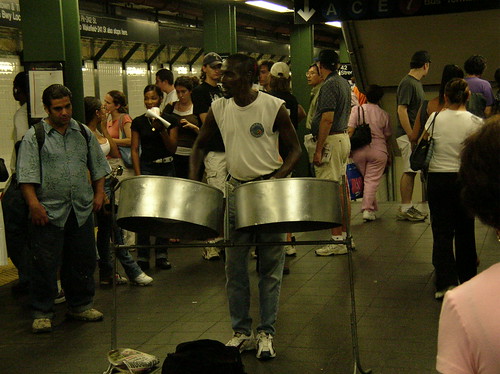
But not a bad steel drum player. No, no, no, no, no. Steel drum sounds okay if it's caribbean music and you're sipping a tropical drink at a beach bar. But there's some awful steel drum fad going around in New York City where they're (a) playing "popular" music standards -- the kinds of pop, jazz and classical tunes you hear on more sophisticated elevators; and (b) still learning how to play the instrument. This guy lapsed into "hunt and peck" moments in his performance several times before my train came.
Where are the taste police when you need them!

But not a bad steel drum player. No, no, no, no, no. Steel drum sounds okay if it's caribbean music and you're sipping a tropical drink at a beach bar. But there's some awful steel drum fad going around in New York City where they're (a) playing "popular" music standards -- the kinds of pop, jazz and classical tunes you hear on more sophisticated elevators; and (b) still learning how to play the instrument. This guy lapsed into "hunt and peck" moments in his performance several times before my train came.
Where are the taste police when you need them!
Friday, September 23, 2005
Existential Friday: What kind of old person do you plan to be?
I've suggested that the key to mid-life crisis is the true dawning realization of mortality. Related to this is another dividing line: those who really understand that they will grow old, and those who don't.
Rest assured: you will become an old person -- if you don't die first, that is. Yes, on some abstract level everybody realizes this, but do they understand what it means?
Our culture indulges itself in a somewhat repulsive amount of disrespect for the elderly. A lot of that manifests itself in comparatively benign behaviors (benign compared to elder abuse, that is) -- mockery, impatience, etc. -- showing a lack of empathy for the maladies and behaviors of aging.
Even those of us who are more understanding often engage in a form of denial in the way we envision ourselves as old people. We will not become the kind of old person who can't walk, who suffers from mild dementia, who rambles and repeats himself all the time. Many of us choose an "old person role model" -- a beloved grandmother, a long-lived philospher, an elder statesman, who is physically spry and mentally sharp as a tack. I've heard tell that 85 year old liberal Supreme Court Justice, John Paul Stevens is in this kind of shape: actively engaged in important work at age 85, impressing his 26 year old law clerks with his keen legal insights.
Basically, we tell ourselves that we will engage in "power aging" (the baby boomer's marketing term for it), and become that spry sharp old person by careful diet and exercise, and doing lots of crossword puzzles or whatever to keep the mind sharp. We'll all become our "old person role models."
But that can't possibly be true, can it? What percentage of old people are role models? 1 in 20? 1 in 50? Whatever the actual percentage, it is a far cry from all or even most of us. Most of us will be infirm. And the brain ages and becomes rigid in its thought patterns, hindered by tiny strokes that basically close off more and more neural pathways. In my case, I will have these set piece anecdotes or witticisms that strike me as continually fresh, but are corny and repetitive. I will say things like "don't talk to me like I'm an old person" and believe I come across as witty and vigorous, when in reality I sound like an old man trying to be funny.
And guess what -- that'll be you too, in all likelihood. We can't all be John Paul Stevens.
Rest assured: you will become an old person -- if you don't die first, that is. Yes, on some abstract level everybody realizes this, but do they understand what it means?
Our culture indulges itself in a somewhat repulsive amount of disrespect for the elderly. A lot of that manifests itself in comparatively benign behaviors (benign compared to elder abuse, that is) -- mockery, impatience, etc. -- showing a lack of empathy for the maladies and behaviors of aging.
Even those of us who are more understanding often engage in a form of denial in the way we envision ourselves as old people. We will not become the kind of old person who can't walk, who suffers from mild dementia, who rambles and repeats himself all the time. Many of us choose an "old person role model" -- a beloved grandmother, a long-lived philospher, an elder statesman, who is physically spry and mentally sharp as a tack. I've heard tell that 85 year old liberal Supreme Court Justice, John Paul Stevens is in this kind of shape: actively engaged in important work at age 85, impressing his 26 year old law clerks with his keen legal insights.
Basically, we tell ourselves that we will engage in "power aging" (the baby boomer's marketing term for it), and become that spry sharp old person by careful diet and exercise, and doing lots of crossword puzzles or whatever to keep the mind sharp. We'll all become our "old person role models."
But that can't possibly be true, can it? What percentage of old people are role models? 1 in 20? 1 in 50? Whatever the actual percentage, it is a far cry from all or even most of us. Most of us will be infirm. And the brain ages and becomes rigid in its thought patterns, hindered by tiny strokes that basically close off more and more neural pathways. In my case, I will have these set piece anecdotes or witticisms that strike me as continually fresh, but are corny and repetitive. I will say things like "don't talk to me like I'm an old person" and believe I come across as witty and vigorous, when in reality I sound like an old man trying to be funny.
And guess what -- that'll be you too, in all likelihood. We can't all be John Paul Stevens.
The "Brilliant" mind of John Roberts at work
The word "brilliant" has come up numerous times in the whole Roberts confirmation process to describe the nominee, far more than it did with, say, Anthony Kennedy. How brilliant is he?
Here are three versions of testimony from day two of his confirmation hearings. Senator Charles Schumer, D-NY, asked this question:
His actual answer (c) is a dumb choice. It leaves an impression that the man has a lingering disrespect for racial and ethnic minorities. It makes him look stubbornly unwilling to admit mistakes, to the point of arrogance. Not a signal that he will be the "humble" chief justice he claims.
Here are three versions of testimony from day two of his confirmation hearings. Senator Charles Schumer, D-NY, asked this question:
SCHUMER: ...[Do]you regret the tone of some of these [Reagan administration] memos? Do you regret some of the inartful phrases you used in those memos, a reference to “illegal amigos” in one memo? ... Could you think that some people might have found it offensive?What did Roberts say in response? Was it
a) ROBERTS: Not at all Senator. It's not like I said "spic" or something. I think our Mexican-- I mean Hispanic amigos would appreciate the humor. They're a fun loving people.Isn't (b), or some version of it, not only the smart answer but the totally obviously smart answer? It makes Roberts look judicious and it's unassailable.
b) ROBERTS: You're quite right Senator. That language is offensive and I would never use it today. I'd like to think I'm wiser than the 28 year old I was when I wrote that regrettable phrase -- I'm certainly older.
c) ROBERTS: Senator, in that particular memo, for example, it was a play on the standard practice of many politicians, including President Reagan. When he was talking to a Hispanic audience he would throw in some language in Spanish.
Again, the memos were from me to Fred Fielding. I think Mr. Fielding always found the tone...
.... It was meant to convey the notion, again, as I described, that when politicians speak to a particular audience in that language, is that offensive to the audience? It was meant to convey that. It was an issue concerning a particular radio interview.
You know, the tone was, I think, generally appropriate for a memo from me to Mr. Fielding, and I know that he never suggested that it was anything other than appropriate.
His actual answer (c) is a dumb choice. It leaves an impression that the man has a lingering disrespect for racial and ethnic minorities. It makes him look stubbornly unwilling to admit mistakes, to the point of arrogance. Not a signal that he will be the "humble" chief justice he claims.
Thursday, September 22, 2005
Remember this face
John Roberts pretty much sailed through his confirmation hearings and the Senate Judiciary Committee. Now 50, he's likely to be on the court a long time: a 25-30 year tenure would be quite within the range of reasonable expectations.
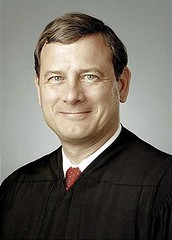

Roberts at 50, left, will look like the 70something Rehnquist,
right, before we see the last of him.
William Rehnquist was just around 48 years old when he was appointed to the Supreme Court. I remember pictures at the time of a middle aged man with black hair, not much gray, and lingering traces of youth. Not unlike Roberts, though Roberts has a haircut that is conservative to the point of quaintness, whereas Rehnquist had sideburns that were slightly to the modish of center.
Supreme Court justices don't get their pictures in the papers all that much or make many public appearances -- even less in the 1970s and 1980s than now. I saw very few if any images of Rehnquist for many years, none that made much of an impression on me. So when I went to the Supreme Court in 1999 to watch an argument on a case I had worked on, I was struck by how old Rehnquist looked. Not that he looked old for the 75 year old man he was then, but he looked old for the 48 year old man frozen in my memory.
I'm several years younger than Roberts, so I stand a good chance of seeing him age like Rehnquist. In my current line of work, I see images of the justices much more often, so I probably won't experience similar shock. But maybe you will. Check back on him in 20 years and see what you think.


Roberts at 50, left, will look like the 70something Rehnquist,
right, before we see the last of him.
William Rehnquist was just around 48 years old when he was appointed to the Supreme Court. I remember pictures at the time of a middle aged man with black hair, not much gray, and lingering traces of youth. Not unlike Roberts, though Roberts has a haircut that is conservative to the point of quaintness, whereas Rehnquist had sideburns that were slightly to the modish of center.
Supreme Court justices don't get their pictures in the papers all that much or make many public appearances -- even less in the 1970s and 1980s than now. I saw very few if any images of Rehnquist for many years, none that made much of an impression on me. So when I went to the Supreme Court in 1999 to watch an argument on a case I had worked on, I was struck by how old Rehnquist looked. Not that he looked old for the 75 year old man he was then, but he looked old for the 48 year old man frozen in my memory.
I'm several years younger than Roberts, so I stand a good chance of seeing him age like Rehnquist. In my current line of work, I see images of the justices much more often, so I probably won't experience similar shock. But maybe you will. Check back on him in 20 years and see what you think.
"Come on-- keep up, will you?!"
That's what I said to my computer this morning when it was performing too slowly. It seemed as though my mind was working, multi-tasking even, at several times the speed of my Windows operating system.
I know, I know. Even when my programs seem to be functioning with agonizing slowness, the CPU is working at light speed compared to my ability to calculate an algorithm or whatever, blah, blah, blah. The computer is our friend, yaddah, yaddah, technology makes us smarter, richer and happier.
It doesn't of course. I recently finished a book about the Lewis and Clark expedition, which pointed out that in 1806 -- before the steam engine and the telegraph -- information traveled overland at the speed of a horse. News and ideas could spread only as far and as fast as a horse-rider could travel in a day. Lewis and Clark made huge news by reaching the Pacific, but they had to bring the news of their success back to civilization themselves. Once they reached St. Louis -- the largest settlement west of the Appalachians -- it took weeks for word to get back to President Jefferson.
Were Americans in 1806 dumber and poorer than we are now? The most you can say is "maybe in some ways." Things are different, but different is not necessarily better, or better in every way.
Here's an illustration. I think the internet is amazing, and I truly believe that the internet serves as a vehicle for the dissemination of accurate information that is superior to the former system in which we depended mostly on a mainstream media oligarchy for our news and information.
And yet, fully armed with the Internet, in 2004 the American people made what may be the stupidest, most ill-informed electoral decision in our history.
What's that about? Technology increases access to information, but doesn't necessarily improve it. The internet is also an incredible vehicle for inaccurate information. The accurate stuff is surrounded by huge volumes of noise. And our brains are not really much faster at analyzing all this stuff.
"Come on -- Keep up, will you"?
I know, I know. Even when my programs seem to be functioning with agonizing slowness, the CPU is working at light speed compared to my ability to calculate an algorithm or whatever, blah, blah, blah. The computer is our friend, yaddah, yaddah, technology makes us smarter, richer and happier.
It doesn't of course. I recently finished a book about the Lewis and Clark expedition, which pointed out that in 1806 -- before the steam engine and the telegraph -- information traveled overland at the speed of a horse. News and ideas could spread only as far and as fast as a horse-rider could travel in a day. Lewis and Clark made huge news by reaching the Pacific, but they had to bring the news of their success back to civilization themselves. Once they reached St. Louis -- the largest settlement west of the Appalachians -- it took weeks for word to get back to President Jefferson.
Were Americans in 1806 dumber and poorer than we are now? The most you can say is "maybe in some ways." Things are different, but different is not necessarily better, or better in every way.
Here's an illustration. I think the internet is amazing, and I truly believe that the internet serves as a vehicle for the dissemination of accurate information that is superior to the former system in which we depended mostly on a mainstream media oligarchy for our news and information.
And yet, fully armed with the Internet, in 2004 the American people made what may be the stupidest, most ill-informed electoral decision in our history.
What's that about? Technology increases access to information, but doesn't necessarily improve it. The internet is also an incredible vehicle for inaccurate information. The accurate stuff is surrounded by huge volumes of noise. And our brains are not really much faster at analyzing all this stuff.
"Come on -- Keep up, will you"?
Wednesday, September 21, 2005
A dubious accomplishment
I've done it. I've crossed the 1,000 threshold in my email inbox. Guess how many are unopened and unread? [Answer below]
I've discussed this problem before: here and here.
What will become of me?
I share with you this poem from last November:
I've discussed this problem before: here and here.
What will become of me?
I share with you this poem from last November:
What happens to an email unread?Answer: 355!!!
Does it harden and crumble like stale bread?
Or go funny and quaint, like the name Fred?
Could it search my hard drive like a hacker nerd?
Or just sit there and stink like a large dog turd?
Does it whine and whimper, or plead or goad?
Or does it explode?
Tuesday, September 20, 2005
Perspective
The Empire State Building:
World's tallest building, 1931-1973
2nd tallest building in New York City (2nd to World Trade Center), 1973-2001
Tallest building in New York City (9th tallest in world), 2001-present
From my perspective on the afternoon of September 18, 2005, the Empire State Building was again second tallest in New York City, edged out by a nameless Queens apartment building, below left.

From right to left: Chrysler Building, Empire State Building,
nameless Queens apartment building.
World's tallest building, 1931-1973
2nd tallest building in New York City (2nd to World Trade Center), 1973-2001
Tallest building in New York City (9th tallest in world), 2001-present
From my perspective on the afternoon of September 18, 2005, the Empire State Building was again second tallest in New York City, edged out by a nameless Queens apartment building, below left.

From right to left: Chrysler Building, Empire State Building,
nameless Queens apartment building.
Bums in seats
[Part I of more than one on Oscar's New York Theories]

The #2 Bronx-Manhattan-Brooklyn express train
If you've ridden on the New York Subway system, you will recognize these seats as standard equipment for subway cars on the 1,2,3 and 9 trains on the West-Side of Manhattan. You will also know that, despite appearances in these photographs, the man on the far right does not have to be obese or slouching sideways for his body to spill over onto the next seat.
Yes, the contoured seats on these subway cars are shaped for exceedingly narrow butts. At crowded times, the average New Yorker must pack his or her booty into those spaces like a big scoop of vanilla ice cream into a sugar cone, and will be pressing the fleshy sides of his or her neighbors while at the same time feeling the seat edge cut into his or her saddle bags.
If the purpose of these narrow seats was to make more room for people to sit, it has perversely failed. Often, people will leave empty spaces rather than try to force themselves in.
So why are the seats designed this way? Two theories:
1) I've heard that the cars were manufactured in Japan, where they were designed for narrower Japanese behinds.
2) The cars were purchased during the mayoral reign of the fastidious and controlling Rudy Giuliani. My theory is that Giulani decreed that the City of New York would refuse to give any sort of official recognition to, or to accommodate in any way, any asses that are more than 14 inches wide.

The #2 Bronx-Manhattan-Brooklyn express train
If you've ridden on the New York Subway system, you will recognize these seats as standard equipment for subway cars on the 1,2,3 and 9 trains on the West-Side of Manhattan. You will also know that, despite appearances in these photographs, the man on the far right does not have to be obese or slouching sideways for his body to spill over onto the next seat.
Yes, the contoured seats on these subway cars are shaped for exceedingly narrow butts. At crowded times, the average New Yorker must pack his or her booty into those spaces like a big scoop of vanilla ice cream into a sugar cone, and will be pressing the fleshy sides of his or her neighbors while at the same time feeling the seat edge cut into his or her saddle bags.
If the purpose of these narrow seats was to make more room for people to sit, it has perversely failed. Often, people will leave empty spaces rather than try to force themselves in.
So why are the seats designed this way? Two theories:
1) I've heard that the cars were manufactured in Japan, where they were designed for narrower Japanese behinds.
2) The cars were purchased during the mayoral reign of the fastidious and controlling Rudy Giuliani. My theory is that Giulani decreed that the City of New York would refuse to give any sort of official recognition to, or to accommodate in any way, any asses that are more than 14 inches wide.
Monday, September 19, 2005
Living well is the best revenge, but being considerate achieves, at best, mixed results as revenge
[See 40 Hours, Thursday, 7:00-9:00 p.m.]
When I sit in an airline departure lounge with a screaming infant or toddler, I experience the sort of inner conflict that used to be depicted in classic cartoons by an angel and a devil, one perched on each shoulder of Donald Duck or Bugs Bunny, whispering into Donald’s or Bugs’s nearest ear. Imagine me with a miniature Oscar on each shoulder – one with white wings and a halo, the other with red horns, a pitchfork and a cute little goatee. I’m trying to read and bring my blood pressure down from the airport screening protocol, when the white noise of the place is pierced by the high pitched shriek of an infant or a chagrined toddler.
It’s a very small plane, with a single-seat / aisle / two-seat configuration. Dad sits right in front of me in the single seat, and across the aisle, Mom has Cassie next to her in the window seat and Casey in her lap – well, crawling around and between seats and into the aisle. Then:

Figure 1.
Of course, the shrieking sounds are more piercing coming up from behind me. Plus, once the flight is underway, Casey has crawled onto Dad’s lap, thanks to my striking a blow for family togetherness, and is kicking the back of my seat. Instant karma proves harder to control than one might think.
When I sit in an airline departure lounge with a screaming infant or toddler, I experience the sort of inner conflict that used to be depicted in classic cartoons by an angel and a devil, one perched on each shoulder of Donald Duck or Bugs Bunny, whispering into Donald’s or Bugs’s nearest ear. Imagine me with a miniature Oscar on each shoulder – one with white wings and a halo, the other with red horns, a pitchfork and a cute little goatee. I’m trying to read and bring my blood pressure down from the airport screening protocol, when the white noise of the place is pierced by the high pitched shriek of an infant or a chagrined toddler.
DEVIL OSCAR: Goddam kids!The drama being played out involved two kids. The toddler – Cassie – is apparently experiencing some major turf/jealousy issues which she was just acting out toward her new sister, Casey. Dad turns to Mom, who has just returned from the food concession:
ANGEL OSCAR: That poor baby!
DEVIL OSCAR: What the hell are those people doing bringing a baby to an airport!
ANGEL OSCAR: I feel so bad for the parents – what a trying couple of hours they have in store for them.
DEVIL OSCAR: That shrieking! It’s going to drive me to rude behavior!
ANGEL OSCAR: I’m sure there’s an evolutionary adaptive advantage that allows human babies to emit full-throated shrieks so they can express their needs.
DAD: I think Cassie just slapped Casey on the side of the head with her [toy thing].Cassie, her violent streak notwithstanding, turns out to be an adorable little towhead. I know this because, when we board the plane, I am of course seated in the row right behind the Cassie-Casey family.
CASSIE: Mommy, she just grabbed my [toy thing] but IT’S MINE.
DEVIL OSCAR: That little girl is a sociopath. She’s totally out of control!
ANGEL OSCAR: She’s just acting out her feelings of abandonment because her mother has to focus so much attention on the infant. It’s a natural and understandable feeling of loss.
DEVIL OSCAR: Screw that. Anyhow, the point is that parents who can’t control their kids in public ought to be HOSED DOWN.
ANGEL OSCAR: Parenting is hard work, and raising the next generation is an important public service. One which you’re just free-riding on, I might add, you childless roustabout.
DEVIL OSCAR: Oh, shut up.
ANGEL OSCAR: You shut up!
DEVIL OSCAR: No, you shut up! I said it first!
It’s a very small plane, with a single-seat / aisle / two-seat configuration. Dad sits right in front of me in the single seat, and across the aisle, Mom has Cassie next to her in the window seat and Casey in her lap – well, crawling around and between seats and into the aisle. Then:
CASSIE: Mommy, make Casey STOP CRAWLING IN MY SEAT!The first problem is that Casey has now been branded for life as a "lap-sitter." What's more, it turns out that there are only two oxygen masks in the Family’s two seat row, but for some reason the pair of seats in the row immediately behind has three masks. (See figure 1)
CASEY: (Shrieks)
MOM: Don’t push your sister, Cassie.
FLIGHT ATTENDANT 1: Ma’am, this row only accommodates two passengers.
MOM: This one will be sitting in my lap once the flight starts.
FLIGHT ATTENDANT 1: Yes, but....
FLIGHT ATTENDANT 2: Is there a problem?
FLIGHT ATTENDANT 1: (Turning to FLIGHT ATTENDANT 2) Yes this woman has a lap-sitter, and...
CASSIE: (To Casey) Lap-sitter, lap-sitter, LAP-SITTER!

Figure 1.
DAD (to Mom): Maybe the woman ["P"] behind you will switch with you and the kids.Bulls eye! Boy, did Dad shoot me the evil eye. He has no choice but to say a sheepish “thanks,” and we all switch seats. Talk about instant karma for Dad!
MOM: Okay, but you’ll have to try to switch with the guy behind you (referring to me, Oscar).
CASSIE: MOMMMEEEE! Make Casey stop crawling on me!
DAD: Well, I was thinking I’d sack out for a while....
DEVIL OSCAR: "Sack out"? And leave Mom alone with the kids! That’s great!
ANGEL OSCAR: "Sack out"? What an asshole!
OSCAR: Um, ma'am? I’d be happy to switch with your husband.
Of course, the shrieking sounds are more piercing coming up from behind me. Plus, once the flight is underway, Casey has crawled onto Dad’s lap, thanks to my striking a blow for family togetherness, and is kicking the back of my seat. Instant karma proves harder to control than one might think.
DAD: Casey, stop kicking that seat.And a bit later, the tray table flops open and clicks back into place. Repeatedly.
DAD: Casey, stop playing with the tray table.The flight finally ends. Dad picks up a couple of mensch points by telling Cassie to wait for people ahead of her to get out of their seats. Cassie looks me straight in the eye and gives me the most adorable smile. I really hope she works out those issues with her sister.
DEVIL OSCAR: WTF!
ANGEL OSCAR: It’s not that long a flight. Maybe the baby will go across the aisle and sit in Mommy’s lap, with the extra oxygen mask.
DAD: Casey, would you like to go sit over there and sit with Mommy and Cassie?
CASEY: NO!
DEVIL OSCAR: You know what? I’ve had it. There’s just too much traveling with young children. Why can’t these people just stay put until their kids are older?
ANGEL OSCAR: Don’t say that. How will the children be able to see their grandparents? And why should parents have their freedom restricted even more? Would you really want to tell wonderful parents of young children, people like Phantom Scribbler and Angry Pregnant Lawyer, that they can’t fly?
DEVIL OSCAR: I know! Let’s start an internet rumor. Right here on the blog: you can refer to “that new health study that suggests that repeated changes in cabin pressure from frequent flying can cause hearing loss and brain damage in young children.” Just make some sh*t up!
ANGEL OSCAR: What a terrible idea! What if it actually causes people to travel less with children? What if the airlines lose money and then track you down and sue you for fraud or trade libel or something?
DEVIL OSCAR: Oh, shut up.
Impending doom
[See 40 Hours, Thursday, 7:55 a.m.]
****** Automated Message - Please Do Not Reply ******
Your [Freakin'] email account provides you with 100MB of storage at no charge. Your account is now at 90% or more of capacity. When it reaches 100%, you will stop receiving new email and those who send you messages will receive email stating their message to you was undeliverable.
Your current quota: 102400 (kb) (Note: 102400KB = 100MB)
Your current usage: 94081 (kb)
Your mailbox is now 91% full.
Age old question answered on subway
You’re all probably familiar with the College Lit 101 insight, which is probably true, that there are “only X number of stories,” and that these are recycled throughout the history of literature. But “X” equals just how many stories?
Today, I heard this dialogue on the subway:
Today, I heard this dialogue on the subway:
YOUNGER WOMAN: You know what they say, there are only, what, seven stories or something?There's your answer. QED.
OLDER RUSSIAN LADY: 100.
YOUNGER WOMAN: What?
OLDER RUSSIAN LADY: (authoritatively) There are 100 stories.
Blog Of the Week™

Adventures in Kicking People is a window into the 20-something life of Sleep Goblin.
Sleep Goblin: great avatar name, with an evocative story behind it. ("I'm not sleepy," said Sleep Goblin in comments somewhere, "I steal people's sleep!") What's that about, exactly? And you have to love the line drawing of the Sleep Goblin itself.
If you ever decide to change the name of your blog from Adventures in Kicking People to Sleep Goblin, you will have my support.
Impulse control for law professors
[See 40 Hours, thursday, 7:00 a.m.]
Have you ever wondered what goes through the mind of a philosophically inclined law professor in a “road rage” situation? The other day, a law professor was being tailgated by a young woman on a motor scooter around campus, who was riding up his ass, making moves as if to pass, and revving the little scooter motor disrespectfully. In fact, the law professor in question actually said one of the following two phrases aloud to himself in his car after several minutes of this tailgating behavior. Was it:
Plus, slamming the breaks would have been really mean.
Have you ever wondered what goes through the mind of a philosophically inclined law professor in a “road rage” situation? The other day, a law professor was being tailgated by a young woman on a motor scooter around campus, who was riding up his ass, making moves as if to pass, and revving the little scooter motor disrespectfully. In fact, the law professor in question actually said one of the following two phrases aloud to himself in his car after several minutes of this tailgating behavior. Was it:
a) “You know, it’s really unsafe to drive your scooter so close behind a car, especially when you’re not wearing a helmet. You’re impatient with the fact that I’m driving the speed limit, but you’re actually quite lucky that I’m such a safe driver.”I’m sorry to say that it was.... Well, let’s just say that the law professor in question quickly went through this thought process: Visions of the college girl careening off the back of his car, suffering serious bodily injury; feelings of remorse; then civil suits and a criminal prosecution, the jury with 20-20 hindsight failing to understand why a law professor of all people couldn’t have been more thoughtful about the consequences of his actions and, above all, more patient with a student!
OR
(b) “I ought to slam on the freakin’ breaks and really f*ck you up, college girl!”
Plus, slamming the breaks would have been really mean.
Oscar's First Blog Anniversary
Wooo Hooo!
Yes, The Columnist Manifesto began one year ago today. Check back throughout the day for fun anniversary party posts, factoids, iced coffee, and more!
Sunday, September 18, 2005
40 Hours
Starting Wednesday evening, I seemed to experience about 40 straight hours of trivial indignities and petty frustrations. The lynchpin of this drama was an ill-timed trip to New York, for which I’d have to work late Wednesday, get up before dawn Thursday for more work, followed by some inconveniently scheduled meetings, then teach my class and rush straight to the airport.
I'm thinking of pitching this as a script idea called "40 Hours," a darkly-comic thriller in which the suspense is whether the succession of individually minor incidents will build, incrementally, to a combined weight that causes the protagonist to crack before his luck changes.
It all starts around Wednesday, 6:30 p.m., when I return to my law school office after a dinner break to find this hallway scene:

A colleague is cleaning her office! The red arrow shows the location of my obstructed office door. (Check out the Ravenclaw pillows in the foreground, or whatever they are.)
Wednesday night-Thursday early a.m.: Promising erotic dream ends in agonizing unfulfillment as I awaken prematurely.
Thursday
7:00 a.m. Driving to work – the taunting-college-girl-tailgating incident.***
[***To be explained in later post***]
7:55 a.m. Email warning incident***
8:00 a.m.-4:30 p.m. I discover I’ve worn the wrong glasses – the ones whose scratch-resistant coating not only fails to resist scratches, but actually disintegrates due to contact with sweat. (Not good hockey glasses!) The mottled lenses cause every point of light to look like a painfully bright greenish candle flame.
4:50 p.m. Rush to the airport. Elderly security line guy wearing insignnia of a private security contractor (he apparently lacks the special qualities needed for employment by the TSA) yells at me because I forgot to have my drivers license in hand.
4:55 p.m. Security screening. I’m sorry, I will never acclimate to having to take off my shoes.
5:30 p.m. Airline announces what it has probably known for at least an hour – that the flight will be delayed by an hour.
5:55 p.m. My attempt to strike up flirtatious conversation with younger woman is rudely rebuffed.
6:55 p.m. I switch seats with family of four, end up sitting in front of seat-kicking tray-playing toddler.
7:00-9:00 p.m. Screaming baby flight.***
8:38 p.m. After drifting off to sleep over my book, am awakened by tapping on my knee. An importunate former law student has occupied the empty seat across the aisle to take the opportunity to chat me up!
10:00 p.m. Only available seat on airport bus is right next to toilet. Sloshing latrine water provides soundtrack for trip.
11:00 p.m. No cabs around port authority. I duck into subway, but the entrance has no fare card machine. When I make my way to fare card machine in another subway entrance, some blocks away, the machine claims inability to read any of my credit cards.
Friday
12:30 a.m. Disappointing Chinese restaurant incident.***
1:35 a.m. All night grocery is receiving deliveries. I have to squeeze aside in the tiny aisles about 10 times to let guys with handtrucks push past me.
1:45 a.m. Desk clerk at hotel says that they are out of ethernet cables. “You can try this code to get on our wireless, but that sometimes doesn’t work.” Sometimes – yeah, right.
1:50 a.m. The chocolate chip welcome cookie provided in my hotel room – which I’ve been thinking about for the past half hour – turns out to be oatmeal raisin.
1:55 a.m. Wifi in hotel room doesn’t work.
2:00 a.m. to 8:45 a.m. Wake up before completion of erotic dream, again.
9:45 a.m. At Startbucks, where “nothing is ever free!” I get onto a wireless network. I don’t know if it’s wi-fi provided by Starbucks, or just spillover from a neighboring apartment building, but I get on free and post a blog. The 40 hours is officially over.
I'm thinking of pitching this as a script idea called "40 Hours," a darkly-comic thriller in which the suspense is whether the succession of individually minor incidents will build, incrementally, to a combined weight that causes the protagonist to crack before his luck changes.
It all starts around Wednesday, 6:30 p.m., when I return to my law school office after a dinner break to find this hallway scene:

A colleague is cleaning her office! The red arrow shows the location of my obstructed office door. (Check out the Ravenclaw pillows in the foreground, or whatever they are.)
Wednesday night-Thursday early a.m.: Promising erotic dream ends in agonizing unfulfillment as I awaken prematurely.
Thursday
7:00 a.m. Driving to work – the taunting-college-girl-tailgating incident.***
[***To be explained in later post***]
7:55 a.m. Email warning incident***
8:00 a.m.-4:30 p.m. I discover I’ve worn the wrong glasses – the ones whose scratch-resistant coating not only fails to resist scratches, but actually disintegrates due to contact with sweat. (Not good hockey glasses!) The mottled lenses cause every point of light to look like a painfully bright greenish candle flame.
4:50 p.m. Rush to the airport. Elderly security line guy wearing insignnia of a private security contractor (he apparently lacks the special qualities needed for employment by the TSA) yells at me because I forgot to have my drivers license in hand.
4:55 p.m. Security screening. I’m sorry, I will never acclimate to having to take off my shoes.
5:30 p.m. Airline announces what it has probably known for at least an hour – that the flight will be delayed by an hour.
5:55 p.m. My attempt to strike up flirtatious conversation with younger woman is rudely rebuffed.
6:55 p.m. I switch seats with family of four, end up sitting in front of seat-kicking tray-playing toddler.
7:00-9:00 p.m. Screaming baby flight.***
8:38 p.m. After drifting off to sleep over my book, am awakened by tapping on my knee. An importunate former law student has occupied the empty seat across the aisle to take the opportunity to chat me up!
10:00 p.m. Only available seat on airport bus is right next to toilet. Sloshing latrine water provides soundtrack for trip.
11:00 p.m. No cabs around port authority. I duck into subway, but the entrance has no fare card machine. When I make my way to fare card machine in another subway entrance, some blocks away, the machine claims inability to read any of my credit cards.
Friday
12:30 a.m. Disappointing Chinese restaurant incident.***
1:35 a.m. All night grocery is receiving deliveries. I have to squeeze aside in the tiny aisles about 10 times to let guys with handtrucks push past me.
1:45 a.m. Desk clerk at hotel says that they are out of ethernet cables. “You can try this code to get on our wireless, but that sometimes doesn’t work.” Sometimes – yeah, right.
1:50 a.m. The chocolate chip welcome cookie provided in my hotel room – which I’ve been thinking about for the past half hour – turns out to be oatmeal raisin.
1:55 a.m. Wifi in hotel room doesn’t work.
2:00 a.m. to 8:45 a.m. Wake up before completion of erotic dream, again.
9:45 a.m. At Startbucks, where “nothing is ever free!” I get onto a wireless network. I don’t know if it’s wi-fi provided by Starbucks, or just spillover from a neighboring apartment building, but I get on free and post a blog. The 40 hours is officially over.
Road Coffee
I know you're concerned about what I'm doing for iced coffee on my New York area trip. Don't worry, I've got it covered.
As you know if you're a reader of this blog, the best iced coffee (e.g., Grandma Moses) is made by cold filtration: letting the fresh ground coffee steep in cold water for at least 24 hours, then filtering it.
Bad, but all-too-common iced coffee is served by places that take the overcooked dregs from their hot coffee pots and refrigerating it. The result is a bitter, burned taste.
To me the worst iced coffee is the "iced Americano," which is hot espresso over ice. The theory is that since espresso is stronger, the major dilution of the coffee caused by melting ice bringing it from hot to cold won't matter so much. This is just idiotic. We drink espresso straight up, or just with milk, and we never think "my god, this is just concentrated coffee that needs to be cut by equal parts water!" So why will cold diluted espresso be any good?
I don't know how Dunkin Donuts makes its iced coffee, but it's quite good: smooth, but with a flavorful edge. Smokey, but in a good way.
As you know if you're a reader of this blog, the best iced coffee (e.g., Grandma Moses) is made by cold filtration: letting the fresh ground coffee steep in cold water for at least 24 hours, then filtering it.
Bad, but all-too-common iced coffee is served by places that take the overcooked dregs from their hot coffee pots and refrigerating it. The result is a bitter, burned taste.
To me the worst iced coffee is the "iced Americano," which is hot espresso over ice. The theory is that since espresso is stronger, the major dilution of the coffee caused by melting ice bringing it from hot to cold won't matter so much. This is just idiotic. We drink espresso straight up, or just with milk, and we never think "my god, this is just concentrated coffee that needs to be cut by equal parts water!" So why will cold diluted espresso be any good?
Left: Don't be fooled by the "Iced Latte" cup -- it's Dunkin Donuts iced coffee. Mmmm.
And as for that black leather car upholstery, that's a story for another day.
Right: Krispy Kreme's iced coffee looks similar, but is not nearly as good.
And as for that black leather car upholstery, that's a story for another day.
Right: Krispy Kreme's iced coffee looks similar, but is not nearly as good.
I don't know how Dunkin Donuts makes its iced coffee, but it's quite good: smooth, but with a flavorful edge. Smokey, but in a good way.
Saturday, September 17, 2005
Progress
New York City recently repealed a longstanding municipal law that had required any transportation terminal with service to New Jersey to be a pit of filth. Check out Penn Station’s new New Jersey Transit waiting area!


Left: Ticket machines. Right: seating section of waiting area.
They even have a clean restroom right there, off to the side of the waiting area. Amazing!
Now all they need to do is to announce the trains at least once prior to the “final boarding call – doors closing – oops you missed it!” announcement.


Left: Ticket machines. Right: seating section of waiting area.
They even have a clean restroom right there, off to the side of the waiting area. Amazing!
Now all they need to do is to announce the trains at least once prior to the “final boarding call – doors closing – oops you missed it!” announcement.
Friday, September 16, 2005
Now where am I?
Existential Friday Lyric
"If I Had Known"
A little creek you could spit across
Jimmy and me each took one more toss
our spinners bright in the evening air
People always said, There ain't no fish in there
Well grownups they ain't always right
Jimmy and me walked home slow that night
right down Main Street in our P.F. Fliers
with two 5 lb. bass making grown men liars
Jimmy if I had known--
I might have stopped fishing right then
It's just as well we don't know when things
will never be that good again
--Greg Brown
A little creek you could spit across
Jimmy and me each took one more toss
our spinners bright in the evening air
People always said, There ain't no fish in there
Well grownups they ain't always right
Jimmy and me walked home slow that night
right down Main Street in our P.F. Fliers
with two 5 lb. bass making grown men liars
Jimmy if I had known--
I might have stopped fishing right then
It's just as well we don't know when things
will never be that good again
--Greg Brown
Thursday, September 15, 2005
What am I (-- chopped liver)?
Message on my answering machine this morning:
Actually, __, I was promoted to "associate" professor when I got tenure, so I'm "still" that (since July).
"Hi, Oscar, this is __. Are you still an associate professor after tenure? I know that can be the case at some law schools. If not, you need to change your outgoing message..."
Actually, __, I was promoted to "associate" professor when I got tenure, so I'm "still" that (since July).
Wednesday, September 14, 2005
Why I love my digital camera
Reason number 16: Collecting Evidence!
Reason number 17: You can spend hours dreaming up courtroom scenarios using your photographic evidence.
Exhibit A
MR. MADISON: Your honor, I would like to mark for identification Defense Exhibit A, a true and accurate photographic depiction of the position of my car taken two hours before I received the parking ticket for parking in a yellow zone. Officer GRZYBOWSKI, isn't it a fact that you issued this parking ticket without carefully looking at the distance between the rear bumper of my car and the beginning of the yellow zone?
OFFICER GRZYBOWSKI: How do we know you didn't move the car?
TRAFFIC COMMISSIONER: And what are those red lines? Were they actually there on the curb?
MR. MADISON: Your honor, I submit that Officer GRZYBOWSKI's entire testimony is a web of lies!
Reason number 17: You can spend hours dreaming up courtroom scenarios using your photographic evidence.
Tuesday, September 13, 2005
Bush Weighs Candidates to Lead FEMA
... According to an unnamed White House source, 5th grader Connor Gryzbowski, a senior member of the Lafayette Elemtary School "safety patrol," is "on the short list" to replace Michael Brown as head of the beleaguered federal relief agency.
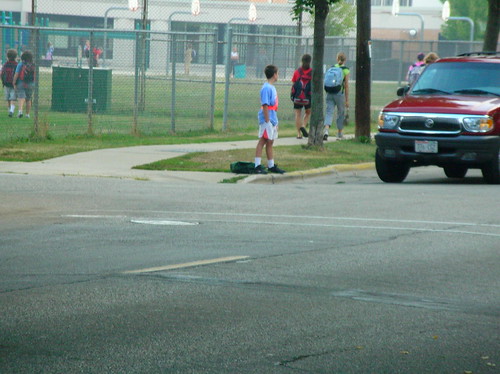
"Connor"
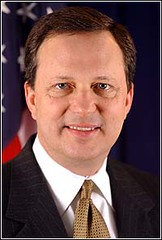
Brown
Speaking on a condition of anonymity, the White House source observed that 10-year old Connor "clearly has more security-related experience than the Arabian horse guy did."

"Connor"

Brown
Speaking on a condition of anonymity, the White House source observed that 10-year old Connor "clearly has more security-related experience than the Arabian horse guy did."
Where's the funny?
Dear readers:
I'm very concerned that I seem to have lost the funny. My recent blog posts have been as thin and patchy as my front lawn after two seasons of drought. Yes, maybe a nice thick green post here and there, but then a lot of weeds, or brown and arid posts, or just bare spots -- days with no posts at all.
The ideas are just not popping into my head. Will I ever get it back? Do I still love blogging? What's going on?
These feelings of self doubt have been compounded by comments from "friends" who happen to read my blog:
What could be the cause of this malaise? Some theories:
1. Start of the new semester. I feel overwhelmed after a summer of procrastination due in part to what some would call excessive... blogging. I just haven't had the time and energy to hunt around for new blogs for Blog of the Week. And haven't I painted myself into a corner with those "**" thingies? I mean, eventually, the whole blogroll will have those, except for the few orginal ones I linked before I started Blog of the Week, who will start to feel slighted.
2. Hurricaine Katrina. Everyone seemed to be understanding about nationwide feelings of stress about 9/11, but you don't hear as much about post-Katrina depression. But clearly it's there.
3. Blog anniversary. On September 19, I will have been blogging for a year. And what do I have to show for it?
4. My "friends" are trying to tell me gently that my blog sucks.
By the way, I hate making up new words with "blog" in them, like "blogiversary." Can we just all agree that the word "blogosphere" is grandfathered in, but anything else is banned on the grounds that such words are just too stublogpid and irriblogtating?
Where's the funny?
I'm very concerned that I seem to have lost the funny. My recent blog posts have been as thin and patchy as my front lawn after two seasons of drought. Yes, maybe a nice thick green post here and there, but then a lot of weeds, or brown and arid posts, or just bare spots -- days with no posts at all.
The ideas are just not popping into my head. Will I ever get it back? Do I still love blogging? What's going on?
These feelings of self doubt have been compounded by comments from "friends" who happen to read my blog:
"Friend": I notice you haven't posted a new "Blog of the Week" for a while.Or this conversation:
Oscar: True. Do you miss "Blog of the Week" when I don't post one?
"Friend": Well, they're always your least interesting posts. But if you're going to have Blog of the Week, you really need to stick with it.
Other "Friend": Hey, you haven't done the "existential Friday" feature for a while.Okay, so the quote marks around "friend" are unfair. Friends don't let friends screw up their blogs, right?
Oscar: No, I missed the last couple of weeks. Why, do you like "Existential Friday"?
O "F": Not really, but if you're going to have a "feature," you need to keep it up.
What could be the cause of this malaise? Some theories:
1. Start of the new semester. I feel overwhelmed after a summer of procrastination due in part to what some would call excessive... blogging. I just haven't had the time and energy to hunt around for new blogs for Blog of the Week. And haven't I painted myself into a corner with those "**" thingies? I mean, eventually, the whole blogroll will have those, except for the few orginal ones I linked before I started Blog of the Week, who will start to feel slighted.
2. Hurricaine Katrina. Everyone seemed to be understanding about nationwide feelings of stress about 9/11, but you don't hear as much about post-Katrina depression. But clearly it's there.
3. Blog anniversary. On September 19, I will have been blogging for a year. And what do I have to show for it?
4. My "friends" are trying to tell me gently that my blog sucks.
By the way, I hate making up new words with "blog" in them, like "blogiversary." Can we just all agree that the word "blogosphere" is grandfathered in, but anything else is banned on the grounds that such words are just too stublogpid and irriblogtating?
Where's the funny?
Sunday, September 11, 2005
Clarification
The thin line between truth and parody
Maybe my post on Friday about the $2,000 tax credit for Katrina refugees was too close to reality to be funny, but it seemed like some of my commenters treated it as a straightforward news post rather than parody.
The cancellation of the $2,000 debit card plan on Friday was sort of an example of events overtaking parody. A far more intense example was The Onion's headline in reference to Cindy Sheehan's protest -- Bush's Vacation Cut Short by "Stupid Dead Soldier"-- which came out just a couple of days before Katrina hit, and the reality became Bush's Vacation Cut Short by "Stupid Destroyed City."
And of course my sidebar on Katrina destruction profiteering by government contractors turns out to have been overtaken by events even before I wrote that. Note how Bush has issued an "emergency" order limiting construction worker wages in connection with post-Katrina rebuilding work, but no order limiting contractor profits for the same work.
Maybe my post on Friday about the $2,000 tax credit for Katrina refugees was too close to reality to be funny, but it seemed like some of my commenters treated it as a straightforward news post rather than parody.
The cancellation of the $2,000 debit card plan on Friday was sort of an example of events overtaking parody. A far more intense example was The Onion's headline in reference to Cindy Sheehan's protest -- Bush's Vacation Cut Short by "Stupid Dead Soldier"-- which came out just a couple of days before Katrina hit, and the reality became Bush's Vacation Cut Short by "Stupid Destroyed City."
And of course my sidebar on Katrina destruction profiteering by government contractors turns out to have been overtaken by events even before I wrote that. Note how Bush has issued an "emergency" order limiting construction worker wages in connection with post-Katrina rebuilding work, but no order limiting contractor profits for the same work.
Saturday, September 10, 2005
The accidental poetry of being a bad listener at meetings
At Thursday's meeting, the organizer was making a point about some very knowledgeable potential collaborators. I thought I heard her say:
It turns out what she really said was:
They know where the fresh berries are.What a great metaphor! It's like "they know where the bodies are buried," only so upbeat. They know where the fresh berries are!
It turns out what she really said was:
They know where the barriers are.I'm not sure where I got "fresh."
My life as a hockey camp
Check out my skating schedule:
M, W, F: up at 5:45, arrive at rink 6:30-6:45, one hour workout, stretch, scrimmage 8-9You may notice that I'm skating every day of the workweek. You may say, "workweek? doesn't he have a day job?" I say, gather ye hockey pucks while ye may.
T, Th: power skating class 12-1
Friday, September 09, 2005
Problem solved!
Bush Administration Proposes $2,000 Income Tax Credit for All Katrina Refugees Trapped in Sports ArenasWASHINGTON -- President George W. Bush, in a major address to the American people, today unveiled an emergency measure for relief of the thousands of Hurricaine Katrina refugees still holed up in the Houston Astrodome or the New Orleans Superdome.
"Help has arrived" says President
"For the last couple of days, I have been entirely focused on this rescue plan," said the President. "I have thought of little else."
Under the White House emergency rescue plan, each individual taxpayer or head of household will receive up to a $2,000 personal income tax credit on their 2005 tax returns with submission of proof to the IRS of at least two weeks residency in either the Houston Astrodome or the New Orleans Superdome, or a combination of the two.
Acknowledging that "thousands of people will be calling the sports domes 'home' for some time to come," the President stressed the importance of making people as comfortable as possible "on the astroturf or wherever folks have found shelter." The key point, according to Mr. Bush is the importance of taking personal responsibility in this time of crisis.
"We think Americans know better how to spend their rescue money than the federal government does," said Mr. Bush. "Some families might find the money best spent on rebuilding their homes, or on investing in a mutual fund toward retirement. Others of you may prefer to spend your $2,000 to pay a roving gang within the stadium to protect you from other roving gangs. Or maybe $2,000 can buy your children's way onto a bus out of town."
"I can't tell you how best to spend your rescue money," the President reassured the anxious Hurricaine Katrina refugees. "If you simply prefer to spend it on comforts, like those inflatable seat cushions for the Astrodome seats, which are made of pretty hard plastic, or food, or toilet paper, or whatever, it's really your choice," the President explained.
The tax credit will be worth just over $2,000 for families earning $100,000 per year or more, according to the Congressional Budget Office, while families at 200% of the federal poverty guideline will receive tax relief totalling approximately $22.75.
OTHER KATRINA NEWS: Halliburton is said to have the "inside track" on restoration contracts in areas hit by Katrina. "They have the experience when it comes to rebuilding destroyed cities," says Vice President Cheney.
Thursday, September 08, 2005
Here's a new one
This is what I wore today to teach in. A crisp white shirt and tie.
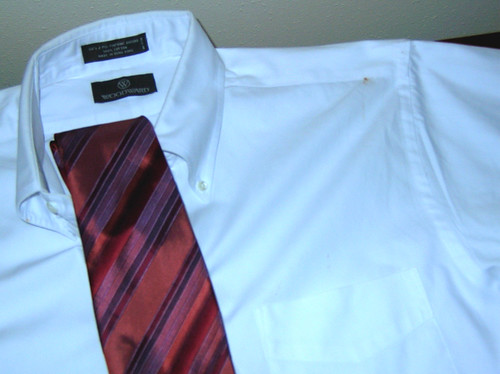
How in the world did I get a chocolate stain on the shoulder?

(The tie is shown, above,to illustrate what a lovely tie I picked out to wear today.)

How in the world did I get a chocolate stain on the shoulder?

(The tie is shown, above,to illustrate what a lovely tie I picked out to wear today.)
No sweat. Well, yes sweat.
This fall, I'm trying to avoid scheduling meetings past 11:30 a.m. on Tuesdays and Thursdays. I have a power skating class through the University that meets 12-1 on those days. My game plan is to skate the class, shower (I've mentioned that I get kind of sweaty skating), grab some lunch and then teach my 2:30-4:30 class.
Unfortunately, today there was a meeting that could only be scheduled today because of the vacation schedule of one of the organizers. I said "yes" to a 1-2 p.m. meeting even though I knew I'd be really pressed for time, it being the first week of classes. I said "I'll be there by 1:10."
At 1:10 I was in the basement parking lot changing from my sweatclothes into professor clothes, and with salty sweat drying on my skin, showed up at the meeting looking professorial (if harried) but feeling like I badly needed a shower.
I arrived at 1:20 ready to unleash the following diatribe at the first sideways glance at being late for my late arrival:
INTERNET POLL QUESTION: The shower is really inconvenient to the rink and the hockey lockers, to the point where I'm considering stopping at a whole other gym (where I have a locker located more conveniently located to the showers) to take my shower.
My T, Th class meets 24 more times this semester. On how many of those class meeting times will I fail to shower? 0? 5? 10? 24?
Unfortunately, today there was a meeting that could only be scheduled today because of the vacation schedule of one of the organizers. I said "yes" to a 1-2 p.m. meeting even though I knew I'd be really pressed for time, it being the first week of classes. I said "I'll be there by 1:10."
At 1:10 I was in the basement parking lot changing from my sweatclothes into professor clothes, and with salty sweat drying on my skin, showed up at the meeting looking professorial (if harried) but feeling like I badly needed a shower.
I arrived at 1:20 ready to unleash the following diatribe at the first sideways glance at being late for my late arrival:
Any meeting time this week was exceedingly inconvenient, but I've made every exertion to be here in order to accommodate someone else's vacation schedule. And it's none of your business what I was doing just prior to our meeting and why I'm all sweaty.Is it not a great waste of energy to compose such angry speeches? In the event, the meeting participants were all sweetness and light. and no one asked me what I'd been doing.
INTERNET POLL QUESTION: The shower is really inconvenient to the rink and the hockey lockers, to the point where I'm considering stopping at a whole other gym (where I have a locker located more conveniently located to the showers) to take my shower.
My T, Th class meets 24 more times this semester. On how many of those class meeting times will I fail to shower? 0? 5? 10? 24?
Wednesday, September 07, 2005
Goodbye, Lone Ranger
William H. Rehnquist was the most conservative justice on the Supreme Court from his appointment in 1972 until Antonin Scalia's appointment in 1986. Supposedly, his occasional but high-profile "lone dissents" in the 1970s earned him the nickname "the Lone Ranger" -- among whom, outside his circle of law clerks, I'm not completely sure, but I read it in The Brethren.
I came of age as a college and law student, an adult, a lawyer and a law professor during William H. Rehnquist's tenure on the Court, and I suppose in a way I'll miss him -- in sort of the same way that one misses Darth Vader after his exit. He's a nemisis that we're used to, and people tend to like what they're used to.
But let's not get confused about what sort of justice Rehnquist was. The Burger Court of the 1970s was fundamentally a Republican court, not as conservative as the Court has been since the mid-1980s, but conservative, and Rehnquist represented its far right wing. With a couple of notable exceptions -- such as his 2000 majority opinion in U.S. v. Dickerson, in which he voted to uphold the exclusionary rule -- he really didn't moderate his views.
If he seems like a more moderate conservative today, it's only because the Court and the country have generally shifted to the right on many issues. There's also a sort of emotional moderation -- a moderation of feelings of strong antipathy -- that can be caused by nemesis-familiarity, or the sympathy one feels for an old man, particularly one who is sick.
Rehnquist was a conservative, politically opportunistic lawyer who followed the administration's marching orders and could not reasonably said to have disappointed the two Republican presidents who nominated him -- Nixon, who named him to the Court, and Reagan, who named him chief.
This is all to say that it's hard for me to get worked up about John Roberts, who is now the nominee to replace Rehnquist. From the point of view of liberals, Roberts may be no better than Rehnquist, but it says here that he will be no worse.
That doesn't mean that the Senate Democrats should simply vote to confirm him. The appointment of a Supreme Court justice is not merely about technical job qualifications (which Roberts undoubtedly has) or "judicial temperament," but it is a highly political process. The constitution's requirement of Senate confirmation was, in my view, intended by the framers to ensure that Supreme court confirmations be tempered by politics.
Bush's nomination of Roberts reflects politics that Senate Democrats are wholly justified in rejecting. Bush was re-elected by the narrowest margin of any incumbent since 1900, after having lost the popular vote in 2000. If he had a statesmanlike bone in his body, he would be looking for a known moderate consensus pick for the Supreme Court. Roberts is not that; his nomination shows Bush playing to his right-wing constituency as much as he can get away with. That alone justifies a "no" vote by a Democratic Senator. Senatorial consensus should not form around someone who is not a consensus nominee.
I came of age as a college and law student, an adult, a lawyer and a law professor during William H. Rehnquist's tenure on the Court, and I suppose in a way I'll miss him -- in sort of the same way that one misses Darth Vader after his exit. He's a nemisis that we're used to, and people tend to like what they're used to.
But let's not get confused about what sort of justice Rehnquist was. The Burger Court of the 1970s was fundamentally a Republican court, not as conservative as the Court has been since the mid-1980s, but conservative, and Rehnquist represented its far right wing. With a couple of notable exceptions -- such as his 2000 majority opinion in U.S. v. Dickerson, in which he voted to uphold the exclusionary rule -- he really didn't moderate his views.
If he seems like a more moderate conservative today, it's only because the Court and the country have generally shifted to the right on many issues. There's also a sort of emotional moderation -- a moderation of feelings of strong antipathy -- that can be caused by nemesis-familiarity, or the sympathy one feels for an old man, particularly one who is sick.
Rehnquist was a conservative, politically opportunistic lawyer who followed the administration's marching orders and could not reasonably said to have disappointed the two Republican presidents who nominated him -- Nixon, who named him to the Court, and Reagan, who named him chief.
This is all to say that it's hard for me to get worked up about John Roberts, who is now the nominee to replace Rehnquist. From the point of view of liberals, Roberts may be no better than Rehnquist, but it says here that he will be no worse.
That doesn't mean that the Senate Democrats should simply vote to confirm him. The appointment of a Supreme Court justice is not merely about technical job qualifications (which Roberts undoubtedly has) or "judicial temperament," but it is a highly political process. The constitution's requirement of Senate confirmation was, in my view, intended by the framers to ensure that Supreme court confirmations be tempered by politics.
Bush's nomination of Roberts reflects politics that Senate Democrats are wholly justified in rejecting. Bush was re-elected by the narrowest margin of any incumbent since 1900, after having lost the popular vote in 2000. If he had a statesmanlike bone in his body, he would be looking for a known moderate consensus pick for the Supreme Court. Roberts is not that; his nomination shows Bush playing to his right-wing constituency as much as he can get away with. That alone justifies a "no" vote by a Democratic Senator. Senatorial consensus should not form around someone who is not a consensus nominee.
Monday, September 05, 2005
Bush's Septembers
It's quite the coincidence that a major national calamity occurred in the first September (give or take a few days) of both Bush's first and second terms of office.
It sounds almost like Greek tragedy. If it were Greek tragedy, hurricaine Katrina would have been something sent down by the Gods to punish Bush for his hubris. What hubris? The rather extreme hubris of claiming to have been chosen by God to lead the country through the 9/11 crisis.
Of course, it's not a Greek tragedy, and it is the people of the Gulf Coast who have been punished, but there will be a Greek chorus of Bush apologists trying to deflect blame away from the President and cry out against making political capital out of tragedy. Yet it was the Bush administration that played 9/11 for all the political value it was worth, trying to portray their front man "w" as a great leader in a crisis. They succeeded in getting him re-elected on that basis.
I find it not one bit surprising that Bush played golf the day after Katrina hit. This strikes me as an impeachable offense: criminal levity.
It sounds almost like Greek tragedy. If it were Greek tragedy, hurricaine Katrina would have been something sent down by the Gods to punish Bush for his hubris. What hubris? The rather extreme hubris of claiming to have been chosen by God to lead the country through the 9/11 crisis.
Of course, it's not a Greek tragedy, and it is the people of the Gulf Coast who have been punished, but there will be a Greek chorus of Bush apologists trying to deflect blame away from the President and cry out against making political capital out of tragedy. Yet it was the Bush administration that played 9/11 for all the political value it was worth, trying to portray their front man "w" as a great leader in a crisis. They succeeded in getting him re-elected on that basis.
I find it not one bit surprising that Bush played golf the day after Katrina hit. This strikes me as an impeachable offense: criminal levity.
Conclusive proof...
... that having a heart-to-heart talk counselling your kids against smoking is ineffective.
While watching a ball game today, I saw an ad encouraging parents to do just that. It was sponsored by Philip Morris.
While watching a ball game today, I saw an ad encouraging parents to do just that. It was sponsored by Philip Morris.
Sunday, September 04, 2005
Oh, Humanities!
Some buildings are sturdy and beautiful, and you want them to last forever. The most "collegiate" buildings on our campus are a couple of stately, red stone examplars of the late-Victorian "Richardson Romanesque" style. I love them.
Then there are buildings that seem like "tear-downs" from the moment they're built, destined by cheapskate corner-cutting to fall into premature decripitude and by deeply flawed design to be destroyed and replaced in less than 30 or 40 years. What a terrible, wasteful life span for a major campus building. This seems to be the fate of our Humanities building.
Designed and built during the anti-war protest movement, the building's salient design concept was "fortress."
It might have looked nice as a parking structure. But a home for, among others, the History department?
This would be a nice green space, but for the fact that it's tucked away inside the huge concrete bunker like a castle keep.
Well, at least this space looks great for skateboarding.
Noooo!
Then there are buildings that seem like "tear-downs" from the moment they're built, destined by cheapskate corner-cutting to fall into premature decripitude and by deeply flawed design to be destroyed and replaced in less than 30 or 40 years. What a terrible, wasteful life span for a major campus building. This seems to be the fate of our Humanities building.
Designed and built during the anti-war protest movement, the building's salient design concept was "fortress."
The battlements of the Humanities building. The idea was that
faculty and academic staff could line the walls and
roll large balls of flaming tar or pour boiling oil on unruly students, below.
faculty and academic staff could line the walls and
roll large balls of flaming tar or pour boiling oil on unruly students, below.
It might have looked nice as a parking structure. But a home for, among others, the History department?
This would be a nice green space, but for the fact that it's tucked away inside the huge concrete bunker like a castle keep.
Well, at least this space looks great for skateboarding.
Noooo!
So where is the skateboarding area?
Saturday, September 03, 2005
Katrina's aftermath: You know what? It IS political
"Can you believe they're trying to make it political?"
This will be (perhaps it is already) the stock response of conservative pundits and Bush apologists in the months ahead, as finger-pointing emerges out of the public scrutiny and outrage over Katrina. There will no doubt be Congressional hearings and a blue-ribbon "Katrina Commission" to investigate the failures that turned a serious natural disaster into an epic manmade one. Great energy will be spent both trying to assign and deflect blame.
Trying to "make political capital" out of the suffering of others certainly can be a cheap political ploy. But then, painting any attribution of fault for a calamity as a "cheap ploy to make political capital" can itself be knee jerk at best or cynical at worst; and it can obstruct efforts to learn lessons about what caused the disaster and how to avoid it in future.
Obviously, it's too early and not yet time to reach conclusions when there are still people in need of rescue. But let's gather a few facts and float a few hypotheses.
1. Everybody agrees that the federal response to this emergency has been abysmal. It's not always unfair to blame the person in charge.
2. Bush "cut short his vacation" on day four of the destruction of a major American city after a predicted hurricaine struck. The fictional Jed Bartlett (and probably the real Bill Clinton) would have ended the vacation the day the hurricaine was predicted to strike and started directing anticipatory measures.
3. The tragedy continuing to play out in New Orleans is a dramatic and epic failure of infrastructure. The aging levees that failed were known to be in need of repair, but federal funding for this was recently cut. Louisiana is a national leader in the trend of short-shrifting funds for infrastructure and public services, including things like police and fire protection.
4. It seems to be finally emerging in news reports that the victims hardest hit by the disaster are poor inner-city residents, the same people hit by withdrawal of funding for public services.
5. The New Orleans disaster is a major national security failure. That's right. You can't stop the hurricaine from hitting, and -- whatever planning may or may not have been able to do to prevent flooding -- the mainenance of law and order and provision of emergency relief are core "security" functions. What is more basic to security than safety, food, shelter and basic medical care? Supposedly, this administration is all over the problem of national security, both at home and abroad. But Katrina may be revealing a gaping hole in the current policy: extended military involvement abroad in an era of tax cutting -- stretching thin our manpower (where's the National Guard when you need them? In Iraq!) and supplies -- leaves huge gaps in national security on other fronts, including the home front.
So let's sum up these tentative hypotheses (again, not firm conclusions): a failure of leadership in a crisis, a failure of national security policy, a failure of infrastructure due to excessive tax cutting and stinting of public expenditure. Okay, who is president? Whose national security policy is currently in place? And what party has taken the lead in pushing for tax cutting and "smaller government"?
Policies that affect the allocation of resources are the core function of politics. If this stuff isn't "political," I don't know what is.
This will be (perhaps it is already) the stock response of conservative pundits and Bush apologists in the months ahead, as finger-pointing emerges out of the public scrutiny and outrage over Katrina. There will no doubt be Congressional hearings and a blue-ribbon "Katrina Commission" to investigate the failures that turned a serious natural disaster into an epic manmade one. Great energy will be spent both trying to assign and deflect blame.
Trying to "make political capital" out of the suffering of others certainly can be a cheap political ploy. But then, painting any attribution of fault for a calamity as a "cheap ploy to make political capital" can itself be knee jerk at best or cynical at worst; and it can obstruct efforts to learn lessons about what caused the disaster and how to avoid it in future.
Obviously, it's too early and not yet time to reach conclusions when there are still people in need of rescue. But let's gather a few facts and float a few hypotheses.
1. Everybody agrees that the federal response to this emergency has been abysmal. It's not always unfair to blame the person in charge.
2. Bush "cut short his vacation" on day four of the destruction of a major American city after a predicted hurricaine struck. The fictional Jed Bartlett (and probably the real Bill Clinton) would have ended the vacation the day the hurricaine was predicted to strike and started directing anticipatory measures.
3. The tragedy continuing to play out in New Orleans is a dramatic and epic failure of infrastructure. The aging levees that failed were known to be in need of repair, but federal funding for this was recently cut. Louisiana is a national leader in the trend of short-shrifting funds for infrastructure and public services, including things like police and fire protection.
4. It seems to be finally emerging in news reports that the victims hardest hit by the disaster are poor inner-city residents, the same people hit by withdrawal of funding for public services.
5. The New Orleans disaster is a major national security failure. That's right. You can't stop the hurricaine from hitting, and -- whatever planning may or may not have been able to do to prevent flooding -- the mainenance of law and order and provision of emergency relief are core "security" functions. What is more basic to security than safety, food, shelter and basic medical care? Supposedly, this administration is all over the problem of national security, both at home and abroad. But Katrina may be revealing a gaping hole in the current policy: extended military involvement abroad in an era of tax cutting -- stretching thin our manpower (where's the National Guard when you need them? In Iraq!) and supplies -- leaves huge gaps in national security on other fronts, including the home front.
So let's sum up these tentative hypotheses (again, not firm conclusions): a failure of leadership in a crisis, a failure of national security policy, a failure of infrastructure due to excessive tax cutting and stinting of public expenditure. Okay, who is president? Whose national security policy is currently in place? And what party has taken the lead in pushing for tax cutting and "smaller government"?
Policies that affect the allocation of resources are the core function of politics. If this stuff isn't "political," I don't know what is.
Thursday, September 01, 2005
Back to school

Does anything say "back to school" more than this: an abandoned red wagon on a college campus, a letting go of childish things in favor of a backpack stuffed with books?
The campus is being gussied up with some last-minute lawn-watering:


Students are milling around, or posing contemplatively on cell phones with picturesque backlighting:
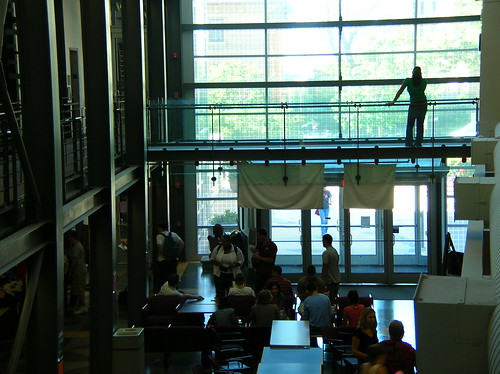
And professors are trolling for course enrollment:
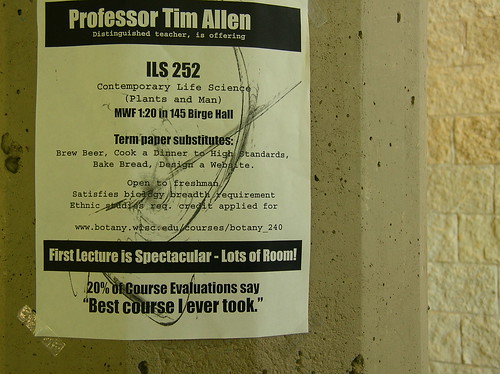
Who wouldn't want to take a course with Tim Allen, even without all those other inducements?
Subscribe to Comments [Atom]
